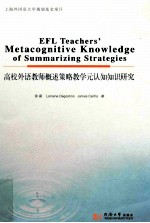
- 作 者:徐蔚,lorraine,dagostino,jamescarifio著
- 出 版 社:上海:同济大学出版社
- 出版年份:2013
- ISBN:9787560851839
- 标注页数:241 页
- PDF页数:270 页
请阅读订购服务说明与试读!
订购服务说明
1、本站所有的书默认都是PDF格式,该格式图书只能阅读和打印,不能再次编辑。
2、除分上下册或者多册的情况下,一般PDF页数一定要大于标注页数才建议下单购买。【本资源270 ≥241页】
图书下载及付费说明
1、所有的电子图书为PDF格式,支持电脑、手机、平板等各类电子设备阅读;可以任意拷贝文件到不同的阅读设备里进行阅读。
2、电子图书在提交订单后一般半小时内处理完成,最晚48小时内处理完成。(非工作日购买会延迟)
3、所有的电子图书都是原书直接扫描方式制作而成。
Chapter One Introduction 1
1.1 Necessity of Exploring ESL/EFL Reading Teachers'Knowledge Base 3
1.2 Difficulty of Exploring ESL/EFL Reading Teachers'Knowledge Base 5
1.3 Status Quo of Exploring ESL/EFL Reading Teachers'Knowledge Base 7
1.3.1 Exploring Teachers'Knowledge Base at the Cognitive Level 8
1.3.2 Exploring Teachers'Knowledge Base at the Metacognitive Level 11
1.4 Research Purpose 15
Chapter Two Design of a Case Study on Metacognitive Knowledge 19
2.1 Base of the Research Design:Carifio-Perla Model 19
2.2 Design of the Research:A Two-Phase Case Study 24
2.2.1 Case Study:Phase Ⅰ 24
2.2.2 Case Study:Phase Ⅱ 26
Chapter Three Construction of a General Metacognitive Knowledge Framework 29
3 1 Understanding the Concept of Metacognition 30
3.2 Distinguishing Metacognition from Cognition 31
3 3 Understanding the Concept of Metacognitive Knowledge 36
3.4 Flavell's Conceptualization of Metacognitive Knowledge 40
3.4.1 Metacognitive Knowledge:A Class of Metacognitive Phenomena 40
3.4.2 Metacognitive Knowledge:The Base of Metacognitive Phenomena 43
3.4.3 Metacognitive Knowledge:Its Three Variables 45
3.5 Other Researchers'Conceptualization of Metacognitive Knowledge 51
3.5.1 Knowledge Structures in Information Processing Theory 51
3.5.2 Knowledge Structures in Cognitive Psychology 52
3.6 A Theoretical Framework of Metacognitive Knowledge 57
Chapter Four Elaboration of the Constructed Metacognitive Knowledge Framework 61
4.1 The Scope of Investigating Reading Teachers'Metacognitive Knowledge 62
4.2 The Identification of the Critical and High Quality Knowledge Base 65
4.3 The Finalization of the Content of The Monograph 69
Chapter Five Val idation of the Metacognitive Knowledge Exploration 75
5.1 Methodology of the Validation 77
5.1.1 Review Panels 78
5.1.2 Data Collection 81
5.1.3 Data Analyses 83
5.2 Results of the Validation 86
5.2.1 Structured Responding Results 86
5.2.1.1 Structured Itern-by-Item Responses by Teacher Educators 87
5.2.1.2 Structured Itern-by-Itern Responses by In-Service Reading Teachers 94
5.2.1.3 Structured Criteria Responses by Teacher Educators 104
5.2.1.4 Structured Criteria Responses by In-Service Reading Teachers 110
5.2.1.5 Structured Responding Results by Both Panels in Comparison 118
5.2.2 Open-Ended Responding Results 122
5.2.2.1 Description of the Open-Ended Responses by Both Panels 123
5.2.2.2 Rated Open-Ended Responses by Teacher Educators 128
5.2.2.3 Rated Open-Ended Responses by In-Service Reading Teachers 131
5.3 All Responses by Both Panels in Comparison 134
5.4 Summary and Discussion of the Results 138
5.4.1 Views on the General MKF Construction 139
5.4.2 Views on the General MKF Elaboration 139
5.4.2.1 A Reading Model 140
5.4.2.2 Enfolding the General MKF in the ESL/EFL Context 140
5.4.2.3 Constructs and Teaching Demands of Summarizing Strategies Instruction 142
5.4.2.4 Strategy Categories of Summarizing Strategies Instruction 145
5.4.2.5 Selection of Cognitive and Metacognitive Pedagogical Strategies 146
5.4.2.6 A Sample Lesson Plan 148
5.4.3 Differences in Evaluating The Monograph 149
5.4.4 Summing-up of the Results 150
Chapter Six Cross-Validation of and Personal Reflection on the Research Process 152
6.1 Cross-Validation of the Results from Other Studies 152
6.2 Analysis of the Informal Research Journal 159
6.2.1 Theme Ⅰ:Understanding the Concept"Metacognition" 161
6.2.2 Theme Ⅱ:Organizing and Synthesizing Resources 163
6.2.3 Theme Ⅲ:Writing of The Monograph 164
Chapter Seven Final Reflections 168
7.1 Overview of the Research Design 168
7.1.1 Phase Ⅰ of the Study:The Theorization Process 168
7.1.2 Phase Ⅱ of the Study:The Validation Process 170
7.2 Limitations of the Case Study 171
7.3 Implications of the Case Study 174
7.4 Directions for Future Research 176
7.5 Concluding Comments 180
References 182
Definition of Terms 195
Appendices 205
Appendix A 205
Appendix B 208
Appendix C 227
